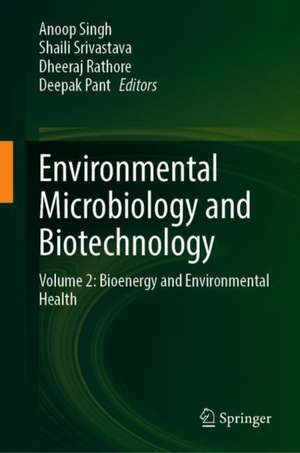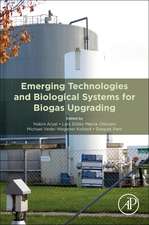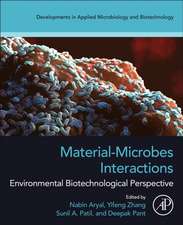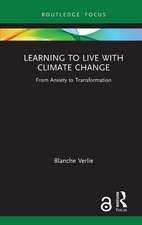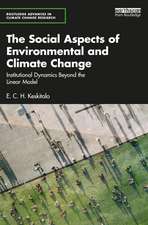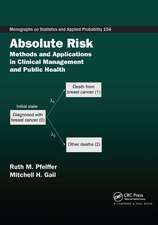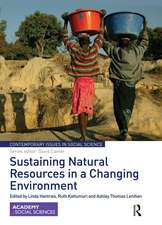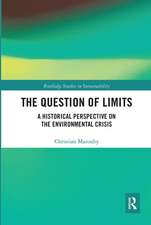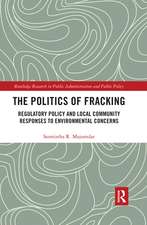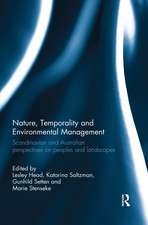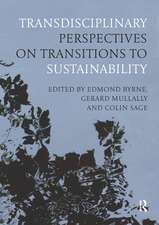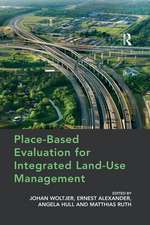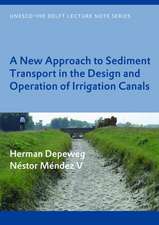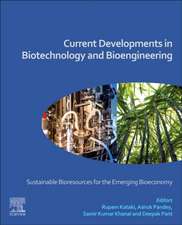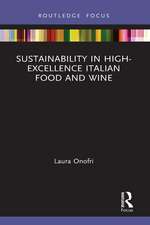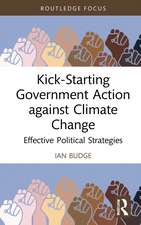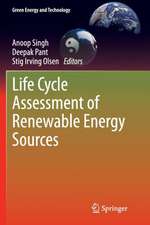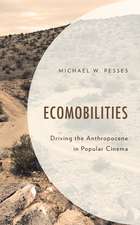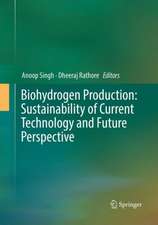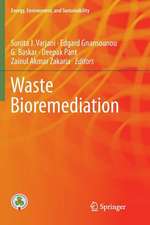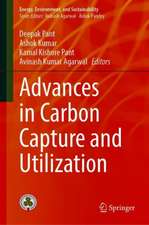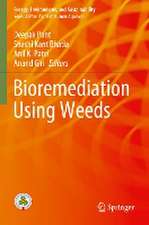Environmental Microbiology and Biotechnology: Volume 2: Bioenergy and Environmental Health
Editat de Anoop Singh, Shaili Srivastava, Dheeraj Rathore, Deepak Panten Limba Engleză Hardback – dec 2020
This second volume of book “Environmental Microbiology and Biotechnology,” covers two main topics: bioenergy and environmental health, exploring the latest developments from around the globe regarding applications of biotechnology and microbiology for converting wastes into valuable products and at the same time reducing the environmental pollution resulting from disposal. Wherever possible it also includes real-world examples. Further, it offers advice on which procedures should be followed to achieve satisfactory results, and provides insights that will promote the transition to the sustainable utilization of various waste products.
| Toate formatele și edițiile | Preț | Express |
|---|---|---|
| Paperback (2) | 785.24 lei 6-8 săpt. | |
| Springer Nature Singapore – 2 dec 2021 | 785.24 lei 6-8 săpt. | |
| Springer Nature Singapore – 25 sep 2021 | 949.10 lei 6-8 săpt. | |
| Hardback (2) | 900.31 lei 6-8 săpt. | |
| Springer Nature Singapore – 24 sep 2020 | 953.65 lei 3-5 săpt. | |
| Springer Nature Singapore – dec 2020 | 900.31 lei 6-8 săpt. |
Preț: 900.31 lei
Preț vechi: 1097.94 lei
-18% Nou
Puncte Express: 1350
Preț estimativ în valută:
172.33€ • 187.25$ • 144.85£
172.33€ • 187.25$ • 144.85£
Carte tipărită la comandă
Livrare economică 21 aprilie-05 mai
Preluare comenzi: 021 569.72.76
Specificații
ISBN-13: 9789811574924
ISBN-10: 9811574928
Ilustrații: XVIII, 364 p. 61 illus., 37 illus. in color.
Dimensiuni: 155 x 235 mm
Greutate: 0.71 kg
Ediția:1st ed. 2021
Editura: Springer Nature Singapore
Colecția Springer
Locul publicării:Singapore, Singapore
ISBN-10: 9811574928
Ilustrații: XVIII, 364 p. 61 illus., 37 illus. in color.
Dimensiuni: 155 x 235 mm
Greutate: 0.71 kg
Ediția:1st ed. 2021
Editura: Springer Nature Singapore
Colecția Springer
Locul publicării:Singapore, Singapore
Cuprins
Chapter 1. Algal biofuel: A sustainable approach for fuel of future generation.- Chapter 2. Microbial and biotechnological advancement in biogas production.- Chapter 3. Role of thermophiles in production of aviation biofuels: fueling the future.- Chapter 4. Bacterial mediated depolymerization and degradation of lignin.- Chapter 5. Microbiology of bioelectrochemical system.- Chapter 6. Application of biotechnology in oil and gas industries.- Chapter 7. Aquatic microbial oxygenic phototrophs: A short treatise on diverse applications and the future biofuel scenario.- Chapter 8. Bioinformatics: a new insight tool to deal with environment management.- Chapter 9. Development of modern tools for environmental monitoring of pathogens and toxicant.- Chapter 10. Interactions of environmental risk factors and genetic variations: Association with susceptibility to cancer.- Chapter 11. Sequestration of carbon dioxide by microorganism and production of value added product.- Chapter 12. Environmentalinteraction and impact on the life span of stem cells.- Chapter 13. Pharmaceuticals: An emerging problem of environment and its removal through biodegradation.- Chapter 14. Metabolism of dioxins and dioxins like compounds, its regulation and toxicological pathways.- Chapter 15. Film based packaging for food safety and preservation: issues and perspectives.- Chapter 16. Biotransformation: Basics and applied perspectives.
Notă biografică
Dr. Anoop Singh holds a Ph.D. in Botany (2004) and is currently a Scientist at the Department of Scientific and Industrial Research (DSIR), Ministry of Science and Technology, Government of India. Before joining DSIR, he worked at the Technical University of Denmark; University College Cork, Ireland; The Energy and Resources Institute (TERI), New Delhi, India; Indian Agricultural Research Institute (IARI), New Delhi; Banaras Hindu University, Varanasi, India; and VBS Purvanchal University, Jaunpur, India. He has participated in several international conferences and has published more than 50 research articles in scientific journals (h-index 27, citation 6937) as well as two edited books with Springer. Dr Singh is a member of various scientific communities and is serving as an editorial board member and reviewer for a number of journals. His research focuses on sustainable agriculture; waste management through agriculture; the utilization of industrial, agricultural, and household waste for eco-friendly energy production; renewable energy; and life cycle assessment (LCA).
Dr Shaili Srivastava is an Associate Professor at Amity School of Earth and Environmental Sciences, Amity University Haryana. She holds a master’s and Ph.D. from G.B. Pant University of Agric. & Technol. with specialization in Microbiology and Biotechnology. Before joining Amity she worked as lecturer and postdoctoral fellow at Jawaharlal Nehru University, New Delhi. Her research focuses on waste water treatment, degradation of PAH, remediation of heavy metals, microbial sequestration of CO2, biofuel and biosurfactant production, genomics and proteomics in CO2 sequestration and value added products formed by microorganisms. She was a Visiting Research Fellow at Murdoch University, Perth, Australia and has been a speaker at various international conferences. Dr Shaili has published 28 research papers in respected international journals, as well as one book and 8 book chapters. She is a life member of various scientific communities and a reviewer for various international Journals. She has completed three research projects sponsored by CSIR, UGC and DST. She has eighteen years of research and teaching experience.
Dr. Dheeraj Rathore is an Assistant Professor at the School of Environment and Sustainable Development at the Central University of Gujarat (CUG), Gandhinagar, India. He holds a Ph.D in Botany from AAI-DU, Allahabad, India and an M.Phil. in Environment Management from Vikram University, Ujjain, India. Before joining CUG, he worked at The University of Dodoma, Tanzania. He has published one book, various book chapters and more than 25 research articles (h-index 12). Dr Rathore is member of several scientific societies and also serves as a reviewer. His research focuses on ecology, stress physiology, waste utilization and biofuel production.
Dr. Deepak Pant is a Senior Scientist at the Flemish Institute for Technological Research (VITO), Belgium. His research focuses on electrosynthesis and bioenergy, specifically, combining electrochemical and biological conversion systems with a focus on CO2 conversion and their combination with separation systems. He has published 4 books (with Springer, CRC Press and Elsevier), 4 Patents, 127 peer-reviewed articles (h-index 55) and 30 book chapters. He is a member of various scientific societies, including ISMET, ISE, BES, BRSI, IFIBiop and AMI. He is the editor of “Bioresource Technology Reports”, associate editor of “World Journal of Microbiology and Biotechnology” and is an editorial board member of the journals: ‘Bioresource Technology’, ‘Scientific Reports’, ‘Molecules’, ‘Sustainability’, ‘Electronic Journal of Biotechnology’, ‘Biofuel Research Journal’, ‘Heliyon’ and ‘Frontiers in Environmental Science’.
Dr Shaili Srivastava is an Associate Professor at Amity School of Earth and Environmental Sciences, Amity University Haryana. She holds a master’s and Ph.D. from G.B. Pant University of Agric. & Technol. with specialization in Microbiology and Biotechnology. Before joining Amity she worked as lecturer and postdoctoral fellow at Jawaharlal Nehru University, New Delhi. Her research focuses on waste water treatment, degradation of PAH, remediation of heavy metals, microbial sequestration of CO2, biofuel and biosurfactant production, genomics and proteomics in CO2 sequestration and value added products formed by microorganisms. She was a Visiting Research Fellow at Murdoch University, Perth, Australia and has been a speaker at various international conferences. Dr Shaili has published 28 research papers in respected international journals, as well as one book and 8 book chapters. She is a life member of various scientific communities and a reviewer for various international Journals. She has completed three research projects sponsored by CSIR, UGC and DST. She has eighteen years of research and teaching experience.
Dr. Dheeraj Rathore is an Assistant Professor at the School of Environment and Sustainable Development at the Central University of Gujarat (CUG), Gandhinagar, India. He holds a Ph.D in Botany from AAI-DU, Allahabad, India and an M.Phil. in Environment Management from Vikram University, Ujjain, India. Before joining CUG, he worked at The University of Dodoma, Tanzania. He has published one book, various book chapters and more than 25 research articles (h-index 12). Dr Rathore is member of several scientific societies and also serves as a reviewer. His research focuses on ecology, stress physiology, waste utilization and biofuel production.
Dr. Deepak Pant is a Senior Scientist at the Flemish Institute for Technological Research (VITO), Belgium. His research focuses on electrosynthesis and bioenergy, specifically, combining electrochemical and biological conversion systems with a focus on CO2 conversion and their combination with separation systems. He has published 4 books (with Springer, CRC Press and Elsevier), 4 Patents, 127 peer-reviewed articles (h-index 55) and 30 book chapters. He is a member of various scientific societies, including ISMET, ISE, BES, BRSI, IFIBiop and AMI. He is the editor of “Bioresource Technology Reports”, associate editor of “World Journal of Microbiology and Biotechnology” and is an editorial board member of the journals: ‘Bioresource Technology’, ‘Scientific Reports’, ‘Molecules’, ‘Sustainability’, ‘Electronic Journal of Biotechnology’, ‘Biofuel Research Journal’, ‘Heliyon’ and ‘Frontiers in Environmental Science’.
Textul de pe ultima copertă
This book provides up-to-date information on the state of the art in applications of biotechnological and microbiological tools for protecting the environment. Written by leading international experts, it discusses potential applications of biotechnological and microbiological techniques in solid waste management, wastewater treatment, agriculture, energy and environmental health.
This second volume of book “Environmental Microbiology and Biotechnology,” covers two main topics: bioenergy and environmental health, exploring the latest developments from around the globe regarding applications of biotechnology and microbiology for converting wastes into valuable products and at the same time reducing the environmental pollution resulting from disposal. Wherever possible it also includes real-world examples. Further, it offers advice on which procedures should be followed to achieve satisfactory results, and provides insights that will promote the transition to the sustainable utilization of various waste products.
This second volume of book “Environmental Microbiology and Biotechnology,” covers two main topics: bioenergy and environmental health, exploring the latest developments from around the globe regarding applications of biotechnology and microbiology for converting wastes into valuable products and at the same time reducing the environmental pollution resulting from disposal. Wherever possible it also includes real-world examples. Further, it offers advice on which procedures should be followed to achieve satisfactory results, and provides insights that will promote the transition to the sustainable utilization of various waste products.
Caracteristici
Information on new developments in the applications of biotechnical and microbiological methodology for best utilization of waste will help the researchers/industrialists for up to date guidance The sustainability assessment will provide information to policy makers about effects of new developments on the society, environment and economy The book will also provide advice on which procedures should be followed to achieve adequate, relevant and acceptable results
